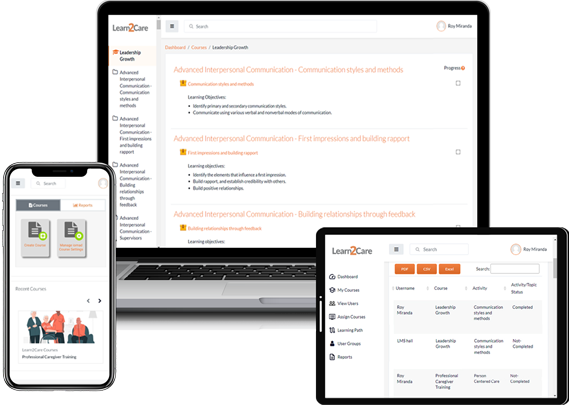
State Recommended
Courses

Caregiver
Training
Certification
Online
Courses
Hours of
Online
Content

Leadership
Courses
Title: PCS Attendant
Min. Initial Training Hours: 40
Continuing Education Hours: 10
State-Specific Curriculum Criteria: Yes
In New Mexico, PCS provides a range of services to a MAP eligible recipient who is unable to perform some or all activities of daily living (ADLs) or instrumental activities of daily living (IADLs) because of a disability or a functional limitation. Becoming a PCS in New Mexico requires exceeding strict state-mandated training standards. Here’s what it involves:
Note: We are committed to helping you stay informed and confident in your compliance efforts with the most accurate, up-to-date guidance we can provide. Our guides and resources are designed to support your training and compliance work, though state regulations may vary and change frequently. Please consult your state’s licensing or regulatory body for official guidance, publications, or requirements.

New Mexico’s diverse population is aging rapidly, with the senior population expected to double by 2030. This, coupled with higher-than-average disability rates and sprawling rural areas, fuels a surging need for Personal Care Services (PCS).
The surge in demand comes with many stringent state regulations aimed at safeguarding the welfare of seniors. Caregivers and agencies must navigate these complex regulations to thrive in this environment.
Here’s a quick breakdown to ensure you’re on the right track:

Mandatory Training
Home care agencies must train PCS attendants in 13 broad topics within three months of hiring.

Proof of Competency
Workers must pass an agency-developed competency exam, with the state requiring agencies to maintain comprehensive training records.

Service Competency
Only trained PCS attendants who have successfully demonstrated essential skills such as bathing, dressing, eating, and toileting can provide services to eligible recipients.

Exemptions
Personal care aides directly employed under Medicaid or private-pay arrangements are not subject to state training regulations due to the absence of licensing requirements for home care agencies.
Ready to answer New Mexico’s call for caregiving? Join the wave of compassionate caregivers and agencies making a difference in the lives of seniors.

Equip caregivers with essential skills tailored to your agency's needs. Upskill administrators, managers, and office staff in leadership, communication, and team management.

230+ online caregiver and leadership training courses, with over 185 engaging hours of content to effectively equip and train your caregivers and home care agency staff.

Create personalized learning journeys, tailoring training to specific roles and expertise areas such as Alzheimer's and dementia care, infection control, and restorative care.

Easily track and report on assignments, completion status, quiz scores, and the individual caregiver's overall progress with our Progress Monitoring system.

Equip your caregivers with content that adheres to the US CMS HHA Conditions of Participation for home health aide services.

Upload your own training materials or empower your team to access built-in courses, streamlining essential training in one accessible location.

Experience seamless on-the-go learning for caregivers, providing unmatched flexibility in diverse work environments.
PCS attendants are required to complete a minimum of 40 hours of initial training within the first year of employment.
Ten hours, including agency orientation, must be completed before entering the MAP eligible recipient's home. Additionally, eight of these hours must be specific to the needs of the MAP eligible recipient.
The training curriculum includes essential areas such as communication, MAP eligible recipient's rights, nutrition, emergency response (first aid, CPR), infection control, housekeeping, home safety, and electronic visit verification (EVV).
Here are the benefits of training certification for agencies and caregivers:
Overall, certification signifies a dedication to professionalism and high-quality care, enhancing your client's trust in your abilities.